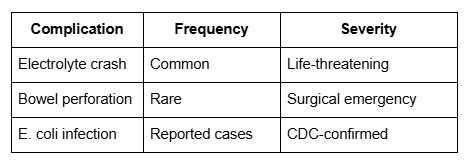Can A Colon Cleanse Jump-Start Weight Loss?

Many people turn to colon cleanses hoping for a quick fix to shed pounds. These methods claim to flush out toxins and boost digestion, but do they really work? While some see temporary results, the truth isn’t as simple as marketing suggests.
Professional treatments, like colonic hydrotherapy, use up to 60 liters of fluid to clear the digestive system. At-home kits promise similar effects but lack medical supervision. The real question is whether these methods deliver lasting benefits or just short-term changes.
Beware of quick fixes. Most "weight loss" from cleansing comes from water and waste removal, not fat loss. Your body naturally detoxes through organs like the liver and kidneys. Before diving in, know the facts.
Key Takeaways
- Colon cleanses may cause temporary weight shifts, not fat loss.
- Professional hydrotherapy uses large amounts of fluid for flushing.
- At-home kits lack medical oversight and may pose risks.
- Detox claims often lack strong scientific backing.
- Your body naturally eliminates toxins without extreme measures.
What Is a Colon Cleanse?

The battlefield of digestive health has seen many tactics, from ancient enemas to modern hydrotherapy. These procedures aim to clear waste from your system, but their methods and safety vary wildly. Let’s break down the mission.
Colonic Hydrotherapy Explained
Think of this as a special ops cleanse. Clinics use a rectal tube to pump up to 60 liters of fluid into your system, flushing out debris like a high-pressure hose. Unlike ancient Egyptian enemas (which relied on clay pots), modern hydrotherapy machines are precise but not FDA-regulated.
At-Home vs. Professional Procedures
Your options:
- Homefront kits: Fleet enemas use 5–7oz of fluid, a "skirmish" compared to clinic-grade irrigation.
- Professional ops: Trained staff monitor the 60L flush, but licensing requirements vary by state. Red alert: Some "hygienists" lack medical credentials.
Historical and Modern Practices

Ancient Greeks believed in "autointoxication", the myth that trapped waste poisons the body. Today, science debunks this, yet coffee colonics (popularized in the 1930s) persist. The real threat? Unregulated procedures risking dehydration or infection.
"Max Gerson’s coffee colonics gained fame in the 1930s, but modern medicine warns against unsupervised use."
The Pros of Colon Cleanse Weight Loss
Flushing your system might seem like a tactical advantage, but the mission isn’t as clear-cut as advertised. Supporters argue these resets offer frontline relief for sluggish digestion and fatigue. Yet the evidence is more guerrilla warfare than structured combat.
Claimed Benefits: Digestion and Energy

A 2016 recon mission, a small pilot study, suggested IBS symptoms improved post-cleanse. But the squad size? Barely a fireteam. Smoke-screen tactics like caffeine enemas may boost energy temporarily, but that’s a stimulant effect, not detox magic.
Other health benefits touted include:
- Short-term bloating relief (water weight, not fat)
- Possible gut bacteria recalibration (no long-term data)
Temporary Weight Loss Mechanisms
Here’s the intel: Laxatives slash just 12% of calorie absorption. Initial 2–5lb drops? That’s water-weight deception, evaporating faster than morning fog. Juice cleanses risk friendly fire, like kidney strain from oxalate overload.
Limited Scientific Support

The battlefield lacks FDA-approved studies proving lasting benefits. As one gastroenterologist notes:
"The body’s own detox systems, liver, kidneys, are elite forces. Extreme flushes are often unnecessary maneuvers."
Bottom line: Proceed with intel, not hype.
The Risks and Dangers of Colon Cleansing
Extreme detox methods can backfire, hard. While marketers sell "flushes" as health boosts, medical reports reveal hazards worse than a grenade in a foxhole. Your gut’s defenses, probiotics, electrolyte balance, can take heavy fire.
Dehydration and Electrolyte Imbalance
Flushing 60 liters of fluid is like draining a Humvee’s radiator mid-mission. The result? Potassium and sodium levels crash, triggering cardiac alarms. One study linked severe dehydration to kidney failure in unsupervised sessions.
Bowel Perforation and Infections
Unsterile equipment is an IED for your intestine. The CDC documented E. coli outbreaks from contaminated tubes. Perforations demand emergency surgery, think MEDEVAC, not a spa day.

Worsening Underlying Conditions
If you’ve got Crohn’s or diverticulitis, cleanses are like napalm on tender terrain. They strip protective bacteria, inviting flare-ups. As one GI doc warned:
"IBD patients risk blue-on-blue attacks, their own immune system turns hostile post-cleanse."
Bottom line: Your liver and kidneys are elite ops. Let them work without friendly fire.
Safer Alternatives for Digestive Health and Weight Loss
Your gut health doesn’t need extreme tactics, just smart, battle-tested strategies. Skip the risky maneuvers and deploy these science-backed methods to keep your system running like a well-oiled machine.
Diet and Lifestyle Changes

Fortify your defenses with fiber. Aim for 25g daily, think whole grains, beans, and berries. This natural "barbed wire" keeps digestion smooth and slashes colorectal cancer risk by 40%.
Hydration is your frontline. Drink 64oz of water daily to keep things moving. Pair it with 150 minutes of weekly exercise to boost gut motility.
- Sleep like a soldier: 7+ hours nightly repairs intestinal walls.
- Cut the enemy’s supply lines: Limit processed foods and sugar.
Medical Supervision for Constipation
When problems arise, call in the pros. Gastroenterologists can deploy targeted laxatives or FDA-approved bowel preps, far safer than recreational flushes.
"Self-treatment risks friendly fire. Always consult your doctor for persistent symptoms."
Why Regular Screenings Matter

Colonoscopies are your air support. They detect threats like polyps before symptoms strike. Start screenings at 45, earlier if you’re high-risk.
Remember: Long-term fat loss comes from steady habits, not shock-and-awe cleanses. Your body’s built to win this war, give it the right intel.
Conclusion
Sustainable results come from strategy, not shock tactics. Colon cleanses are high-risk maneuvers with little reward, like charging into battle without intel.
Rally your allies. Consult a doctor before any extreme measures. Your body’s natural detox systems are elite forces; trust them.
Real victory? It’s earned through disciplined nutrition and exercise. First, do no harm applies to your health, too.
Share this intel. Awareness saves lives, and guts.
FAQ
Can a colon cleanse help with weight loss?
While some people report temporary weight reduction due to water loss and waste removal, it’s not a sustainable fat-loss solution. The body quickly regains fluids, and there’s little evidence supporting long-term benefits.
What’s the difference between colonic hydrotherapy and at-home cleanses?
Colonic hydrotherapy is a professional procedure using filtered water to flush the large intestine. At-home methods often involve supplements or enemas, which carry higher risks if misused. Always consult a doctor before starting any regimen.
Are there proven health benefits to colon cleansing?
Limited research supports claims like improved digestion or energy. Some users feel lighter temporarily, but risks like dehydration and infection outweigh unverified perks. Focus on fiber-rich diets and hydration for gut health.
What are the dangers of colon cleansing?
Risks include electrolyte imbalance, bowel perforation, and worsened conditions like IBS. Overuse can strip beneficial bacteria, disrupting your digestive system’s natural balance. Severe cases may require emergency treatment.
What are safer alternatives for digestive wellness?
Prioritize whole foods, probiotics, and hydration. Regular exercise and medical check-ups, including colonoscopies when recommended, are far more effective for long-term health than quick-fix cleanses.





